|
|
 |
|
| The Tempest William Shakespeare |
| ODU Theatre, October 12th - 28th, 2001 |
| Directed by |
Leon Ingulsrud |
| Set by |
Elwood Robinson |
| Lights by |
Phil Watson |
| Sound by |
Leon Ingulsrud |
| Costumes by |
Jennifer Atkins |
|
|
|
|
|
|
|
 |
| This was the fifth production of mine at Old Dominion University. The process was marked by the events of September 11th. The themes of vengence, loss and restoration of order all had new powerful meaning in the new milieu of American life. |
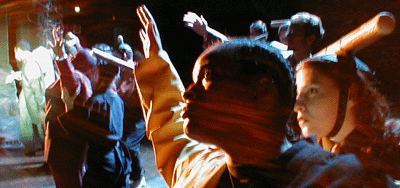 |
| It had been a few years since I had the pleasure of working on Shakespeare. The Tempest is a facinating text for many reasons, not least of which is the way that it interweaves elements of tragedy, comedy and fantasy. Few of Shakespeare follow the Aristetilian rules of unity of time and place quite as faithfully as this one, However when it comes to plot it's as thin as paper. The early scenes are huge masses of exposition and the later scenes are, for the most part poetry that has little connection to action. |
Because of this, the door is wide open for all kinds of showmanship. In the first half you have to make the stage interesting for the exposition, and in the second half there are lots of oportunities for song and dance and theatrical trickery. The majical environment of the island and the importance of both dream and memory also make this a fertile text.
Another interesting aspect of this play is the way in which the various groups of charactors have almost no contact with each other until the 5th act. |
 |
|
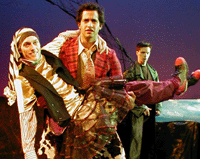 |
As a result, despite the fact that it was (as most of my productions are) an ensemble piece, we rehearsed many of the sections independently. We then staged Prospero into every scene so that he never left the stage. Aside from provideing an underlying theatrical glue that pulled everything together, this strengthened the idea that all of the action of the play is "caused" or overseen by Prospero. |
|
Director's Note:
It is difficult to deny that working on a play by William Shakespeare is a singular experience for an American theatre artist. There are reasons why Shakespeare's works have the heavily loaded reputation that they do. They are long. They are complex. They are written in a poetic form of English that is sometimes difficult for the audience (or actor for that matter) to make sense of. They are breathtakingly beautiful.
It saddens me deeply that contemporary culture has confined Shakespeare to the rock of tradition and the pickling suffocation of propriety. I have had the privilege of seeing and working on Shakespeare's plays in many languages and contexts. The Bard's work is perhaps the richest of the English-speaking world's contributions to world culture. But it is indeed just that; a part of world culture. As such, we who speak English have the extra burden when working on it to pry it away from the deadening antiquarian assumptions about how it is supposed to be done. There are many things one can say about Shakespeare, but one thing is certain. He loved life. It behooves us now to celebrate life with his plays, not reanimate Elizabethan literary mummies. |
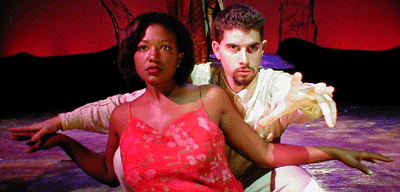 |
One of the things that I love most dearly about the works of Shakespeare is that they are, like all great works of art, both timely and timeless. There are jokes, songs and references in The Tempest which only a literary scholar, a dramaturg, or a Shakespeare geek could fully appreciate in the United States of 2001. They spoke vividly to a small society in Elizabethan England, but are in many cases, impenetrable to us now. Despite these things which ground the work to a specific time and place, there is that in the heart of the work that is universal.
On September 11, during the rehearsal process for this production, American culture went through a drastic change. It has been a difficult process for everyone, but there was profound sustenance in the realization that the themes of The Tempest seem to ring even truer now. What do we do in the face of wrong? How do deal with those who have wronged us? How do we simultaneously serve justice and liberty? Like many of Shakespeare's plays The Tempest deals with power. Power in many forms. In it's barest form, the plot deals with Prospero regaining the political power which has been stolen from him by a conspiracy led by his brother Antonio. Stripped of his social power, Prospero uses magical power to achieve his ends. The world is out of balance and Godlike Prospero uses supernatural forces to bring equilibrium. |
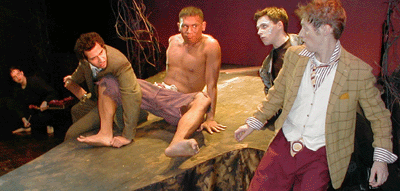 |
In this sense The Tempest is a very classical play. It has all the ingredients of a tragedy. But in the last act, Shakespeare chooses to use his literary power to forgive. Would that we lived in a world where such a story were realistic instead of romantic. It has been argued that Prospero is an autobiographic image of Shakespeare himself. Finding himself at the end of the Renaissance and realizing that the relevance of his powers as an artist in the dawning enlightenment is threatened, he chooses the humane course of abjuring his power rather than wreaking vengeance. The new landscape of American culture also challenges the role of the artist in an important way. A few days after 9/11, I heard a story on NPR about a cellist who went down to ground zero in New York and played his cello. When asked why he was doing this he said that he remembered seeing a picture of a flower pushing it's way up through the ash and blooming in the aftermath of the Mt. St. Helens eruption. He wanted to be that flower.
Leon Ingulsrud, October 2001 |
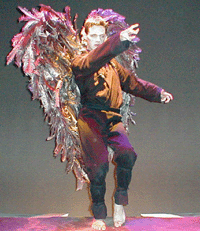 |
Please feel free to contact Leon if you have any comments or questions.
|
|
|